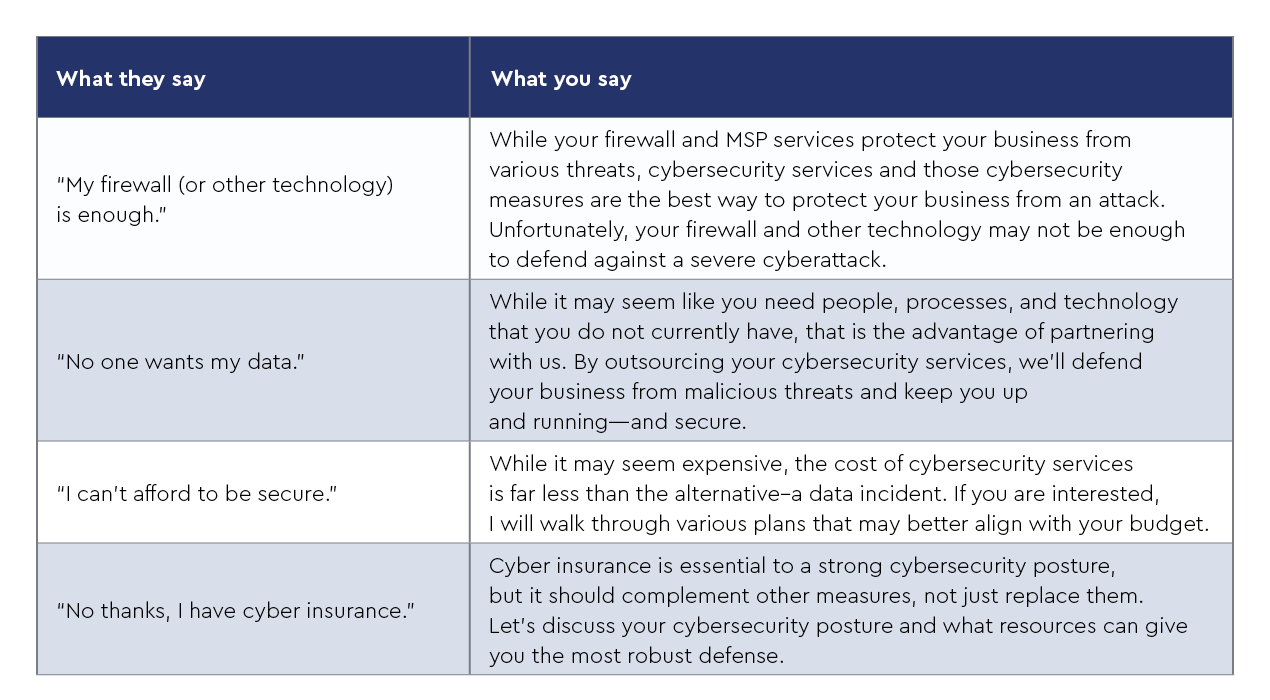In an era where cyberthreats are evolving at an alarming rate, managed service providers (MSPs) are at the frontline, tasked with safeguarding their clients' digital assets. Yet, selling cybersecurity services can be a daunting challenge. The key lies in not just highlighting the technical prowess of the solutions offered but in articulating the value, necessity, and strategic importance of such services. Here’s a comprehensive guide on how MSPs can effectively sell cybersecurity.
The cybersecurity sales conversation outline
There’s no “perfect” script to follow when selling cybersecurity services. As a salesperson, it’s your job to navigate the conversation from prospecting the lead to closing the deal.
Within your sales conversation, make sure to do the following.
Chances are that your prospect or client will have an objection or two to cybersecurity services. Make sure you offer time to address these concerns and be prepared to answer them with data.
- Address the expense and the cost of inaction.
Every prospect and client wants to know what cybersecurity services will cost them. Don’t let the numbers scare them! Offering the cost of action and inaction may provide both perspectives for them to consider.
Do you know someone who prevented a cyberattack? Do you know someone who didn’t? Share the story.
- Give them actionable steps forward.
How can you move forward on this prospect or client? Give detailed next steps to ensure alignment.
Understand the client’s pain points
The foundation of any successful sale starts with a deep understanding of the client's pain points. As an MSP, it’s your job to conduct a thorough assessment of the prospective client's current cybersecurity posture to identify gaps and vulnerabilities that could be exploited by cyber adversaries. Presenting clear, tangible risks specific to their business can make the need for cybersecurity services more urgent and compelling.
Common MSP challenges when selling cybersecurity services
62% of SMBs say they would definitely consider changing providers if they offered the “right solutions.” However, as an MSP, it’s not always easy to know what the “right” solution is for opportunities you’re exploring. In fact, it’s often a challenge for MSPs to sell cybersecurity services because of the difficult nature of the selling process.
MSP salespeople face various objections to selling cybersecurity and must be equipped to provide a thought-provoking response to hopefully discount the proposed concern. Common challenges of selling cybersecurity services include:
In an era where cyberthreats are evolving at an alarming rate, managed service providers (MSPs) are at the frontline, tasked with safeguarding their clients' digital assets. Yet, selling cybersecurity services can be a daunting challenge. The key lies in not just highlighting the technical prowess of the solutions offered but in articulating the value, necessity, and strategic importance of such services. Here’s a comprehensive guide on how MSPs can effectively sell cybersecurity.
The cybersecurity sales conversation outline
There’s no “perfect” script to follow when selling cybersecurity services. As a salesperson, it’s your job to navigate the conversation from prospecting the lead to closing the deal.
Within your sales conversation, make sure to do the following.
Chances are that your prospect or client will have an objection or two to cybersecurity services. Make sure you offer time to address these concerns and be prepared to answer them with data.
- Address the expense and the cost of inaction.
Every prospect and client wants to know what cybersecurity services will cost them. Don’t let the numbers scare them! Offering the cost of action and inaction may provide both perspectives for them to consider.
Do you know someone who prevented a cyberattack? Do you know someone who didn’t? Share the story.
- Give them actionable steps forward.
How can you move forward on this prospect or client? Give detailed next steps to ensure alignment.
Understand the client’s pain points
The foundation of any successful sale starts with a deep understanding of the client's pain points. As an MSP, it’s your job to conduct a thorough assessment of the prospective client's current cybersecurity posture to identify gaps and vulnerabilities that could be exploited by cyber adversaries. Presenting clear, tangible risks specific to their business can make the need for cybersecurity services more urgent and compelling.
Common MSP challenges when selling cybersecurity services
62% of SMBs say they would definitely consider changing providers if they offered the “right solutions.” However, as an MSP, it’s not always easy to know what the “right” solution is for opportunities you’re exploring. In fact, it’s often a challenge for MSPs to sell cybersecurity services because of the difficult nature of the selling process.
MSP salespeople face various objections to selling cybersecurity and must be equipped to provide a thought-provoking response to hopefully discount the proposed concern. Common challenges of selling cybersecurity services include:
- Scarcity of cybersecurity resources
- Sales acumen
- Marketing gaps, GTM experience
- Continuous education certifications
- Solution stack
- Pricing and bundling challenges
Best practices when selling cybersecurity
1. Emphasize the value proposition
While technical specifications are important, they often don't resonate with non-technical stakeholders. Instead, focus on the value proposition of your cybersecurity services:
- Risk mitigation: Highlight how your services can prevent potential breaches and the associated financial, reputational, and operational damages.
- Compliance: Many industries have regulatory requirements. Emphasize how your services help clients stay compliant with regulations such as GDPR, HIPAA, or PCI-DSS.
- Business continuity: Explain how robust cybersecurity measures ensure business continuity by protecting against ransomware attacks and data breaches.
2. Use real-world examples and case studies
Providing real-world examples and case studies can dramatically enhance your pitch. Share stories of businesses like your prospect that have faced cyberthreats and how your services have protected them. Case studies can bridge the gap between abstract concepts and tangible results, making your offering more relatable and credible.
3. Offer a comprehensive security assessment
Before proposing solutions, offer a comprehensive security assessment as a value-add. This can be a powerful tool to demonstrate the current vulnerabilities within the client's systems. A detailed assessment report can serve as a baseline, highlighting critical areas that need immediate attention and how your services can address these issues.
4. Provide scalable solutions
Businesses grow, and so do their cybersecurity needs, so it’s important to emphasize the scalability of your solutions. Clients should feel confident that as their business expands, your services can seamlessly scale to meet the increasing demands. Offering flexible pricing models and packages can also make your services more attractive to businesses of varying sizes.
5. Highlight proactive and reactive capabilities
Your cybersecurity services should offer both proactive and reactive capabilities. Proactive measures include threat detection, vulnerability assessments, and penetration testing that help identify and mitigate risks before they can be exploited.
Reactive measures involve incident response and remediation strategies to quickly address and recover from cybersecurity breaches. Stress the importance of a comprehensive approach that encompasses both aspects to provide holistic protection.
6. Build trust through transparency
Trust is a critical component in selling cybersecurity. Be transparent about your processes, tools, and methodologies. Clearly explain how customer data will be handled, stored, and protected. Offering regular reports and updates can build confidence and demonstrate that you are a reliable partner committed to cybersecurity.
7. Train and educate
Cybersecurity is not just the responsibility of the IT department; it’s a company-wide concern—especially when almost 90% of cyberattacks are caused by human error. It’s important to offer training and educational resources to your clients. This can include regular security awareness training for employees to recognize phishing attempts, safe browsing habits, and the importance of strong passwords. An educated workforce can be the first line of defense against cyberthreats.
8. Leverage your toolset
For SMBs in various sectors, cybersecurity defenses are becoming increasingly popular. As you’re moving through the selling process, be sure to highlight how your toolset and services are prepared to keep your clients protected. Listen carefully to their pain points so you can offer the best services and tools based on those needs, such as:
- Managed detection and response (MDR)
MDR provides continuous monitoring and immediate response to threats so SMBs can focus on running their business, not defending it. Explain the benefits of having a dedicated team of experts who can quickly detect and mitigate threats, reducing the potential damage.
- Security operations center (SOC)
A SOC can be a significant selling point. Explain how your managed SOC services provide round-the-clock monitoring and protection. Highlight the expertise of your SOC team and the advanced tools they use to detect and respond to threats in real time. A managed SOC can assure clients that their cybersecurity is being watched over 24/7 by professionals.
- Security information and event management (SIEM)
SIEM offers enhanced security, proactive threat detection, and effective incident response for SMBs looking to stay protected from threats. Assure the client or prospect that their networks and systems will be continuously monitored for potential threats and vulnerabilities, minimizing the impact of breaches and ensuring business continuity.
9. Communicate the ROI
All businesses are often driven by the bottom line, including the ones you’re selling to—so make it easy for them to say “yes.” Clearly communicate the return on investment (ROI) of your cybersecurity services. Use statistics and data to show how investing in cybersecurity can save money in the long run by preventing costly breaches, avoiding regulatory fines, and maintaining customer trust.
Address common objections
Be prepared to address common objections clients might have, including:
- Cost: Offer flexible pricing models and highlight the long-term savings and benefits of investing in cybersecurity.
- Complexity: Assure clients that your services are user-friendly and that your team will handle the complex aspects.
- Trust: Build trust by sharing testimonials and case studies and offering trial periods or proof-of-concept engagements.
Overcoming common cybersecurity objections
Almost every prospect you speak to will have an objection at some point in your pitch. While it can be intimidating, objections offer you a chance to reposition your services to highlight the value you provide.

Do you have additional SMB objections that you are unsure how to respond to?Check out the enablement resources from the ConnectWise Partner Program™ to help. >>
Conclusion
Selling cybersecurity services to SMBs requires a strategic approach that emphasizes value, trust, and ongoing support. By understanding your client's needs, providing comprehensive solutions, and building strong relationships, you can effectively sell your cybersecurity services and help your clients protect their valuable digital assets.












